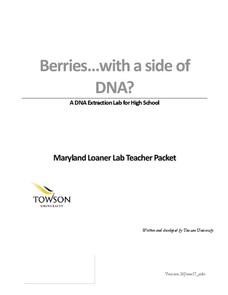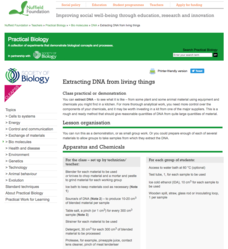Towson University
Berries...With a Side of DNA? (High School)
Is DNA still present after picking fruit or cooking vegetables? Biology scholars extract and collect DNA strands in an impactful lab. Working groups prepare their samples and compare their results to negative and positive standard...
Curated OER
The Watson-Crick Model of DNA Structure
Junior geneticists construct models of DNA to discover sequencing and pairing of nucleotides. They use the models to simulate protein synthesis and then translate the codes into physical traits. Finally, they use the traits to create a...
Curated OER
Nucleic Acids
A lively presentation presents general facts and history of nucleic acids in a note-taking format. Every slide contains colorful photos or graphics to illuminate and engage. Biology aces learn about the function and structure of...
Cengage Learning
COVID-19 and Coronaviruses
COVID-19 = CO (corona) + VI (virus) + D (disease) =19 (the year the disease first appeared) NOVEL (unknown to scientists and never before infected human patients). A colorful nine-slide presentation details what is currently known about...
Museum of Science
Strawberry DNA
Humans aren't the only ones with DNA—fruit has it too. Using a extraction solution, pupils pull the DNA out of a piece of fruit. Learners crush up a piece of fruit with the solution and filter out the solids. Scholars then add cold...
Agriculture in the Classroom
Design 'Y'er Genes
How do changes in DNA affect an organism? Scholars explore chromosomes, genes, DNA, and mutations by modeling the DNA of a strawberry. They build a DNA model, then manipulate it to show how changing the genes transforms the strawberry...
Biology Junction
DNA and Replication
Enzymes proofread DNA, reducing the error rate to one in one billion base pairs. Learn about the important process and so much more with the help of a presentation. It opens with the history of DNA and the major scientific contributions...
Biology Junction
The Structure of DNA
Did you know that all life on Earth has DNA? Explore the importance of the molecule by learning about its structure. The unique DNA shape, bases, and bonds allow the incredible diversity seen all over the world.
Kenan Fellows
Unit 2: DNA Analysis
Ever wonder how they solve those mysterious murders in TV crime dramas? The second of four units in a Biotechnology series introduces scholars to the many methods of DNA analysis. Pupils create and run their own gel electrophoresis...
Nuffield Foundation
Extracting DNA from Living Things
Help! Someone's trying to take my DNA! An interesting lab experiment has scholars use basic materials to extract DNA. By applying ethanol, cold water, and a protease enzyme, like pineapple juice, they pull strands of DNA from peas,...
Chemistry Collective
Virtual Lab: DNA Binding Problem
Why do the bases in DNA pair up the way they do? Unravel the mystery of the double helix in a virtual lab. Young scientists follow in the footsteps of Watson and Crick to determine the free energy associated with DNA base pair binding....
DiscoverE
Building with Biology
Seeing is believing! Bring DNA to life for young biologists using a simple extraction lab. Individuals extract the DNA from wheat germ, then place it in a microcentrifuge tube for observation. They thread yarn or other material through...
Concord Consortium
DNA: The Double Helix
Picture a double helix as a twisted ladder. Scholars see this image through a simulation that allows young scientists to observe a small fragment of DNA in many different formats. They compare the models, colors, bonds, and strands as...
Towson University
Case of the Crown Jewels
Can your biology class crack the Case of the Crown Jewels? Junior forensics experts try their hands at DNA restriction analysis in an exciting lab activity. The lesson introduces the concept of restriction analysis, teaches pipetting and...
Towson University
Berries...With a Side of DNA?
Sometimes science lab can be ... delicious! Middle school science scholars extract DNA from strawberries and other fruits in an engaging lab activity. The teacher's guide includes pacing, materials list, and worksheets with answer keys.
LABScI
DNA Structure: Gumdrop Modeling
DNA molecules hold the secrets that make us unique. The fourth of 12 lessons explores the structure of DNA by building candy models. After building the models, young scientists break their models to begin the process of DNA replication....
Teach Engineering
DNA Forensics and Color Pigments
Use food coloring in electrophoresis. The last segment in a four-part series mimics DNA fingerprinting by using chromatography. Teams conduct chromatography on food coloring to find colors that use similar pigmentation in their makeup.
Teach Engineering
Restriction Enzymes and DNA Fingerprinting
Show your class why restrictions aren't always a bad thing. In the third segment of a four-part series, the instructor develops the idea of restriction enzymes. Pupils learn how scientists use restriction enzymes in DNA analysis and DNA...
Teach Engineering
Imagining DNA Structure
Let's get a closer look at DNA and other molecular structures. The first activity in the series of four introduces a variety of imagining techniques that engineers and scientists use to visualize molecular structures. The resource...
Teach Engineering
Inside the DNA
Get your class to take a closer look at DNA. Pupils conduct research to determine the methods used by scientists to analyze the molecular structure of DNA. The class members investigate different types of molecular imaging along with gel...
Curated OER
Extracting DNA from Your Cells
Three steps are needed to extract DNA from learners' inner cheek cells. The procedure and reasons for each step are explained. As enzymes work on the cells, a series of questions are answered regarding the structure of the DNA molecule....
Curated OER
DNA Extraction
Students discover the basic structure of DNA and its function in living organisms by conducting an experiment in which they extract DNA from bananas using a lysis buffer solution.
Curated OER
Raven Chapter 14 Guided Notes: DNA, the Genetic Material
Because it is heavily focused on the contributors to DNA theory, this worksheet may be more of an enrichment than a fundamental support to your genetics curriculum. Though it does query learners about DNA structure, replication, and...
Curated OER
Using a Controlled Experiment to Identify Two Unknown Plasmids
Student demonstrate knowledge of recombinant DNA techniques (restriction enzyme digest, gel electrophoresis, and staining gel). They demonstrate skills needed to complete a gel electrophoresis and interpret a stained gel. Pupils solve...

























